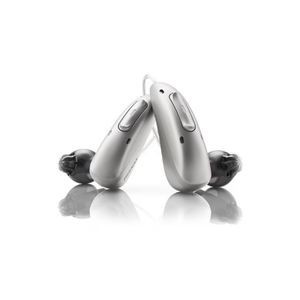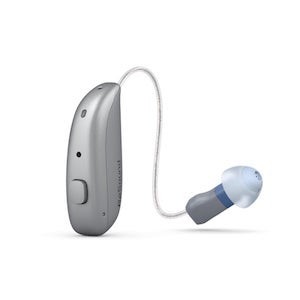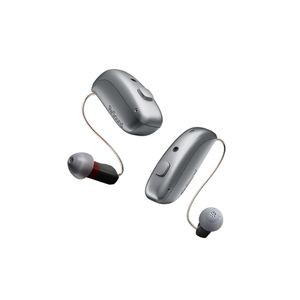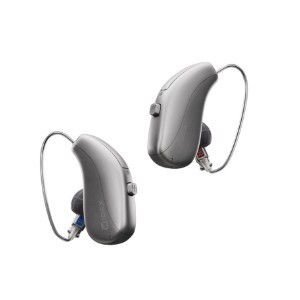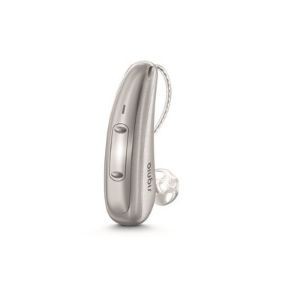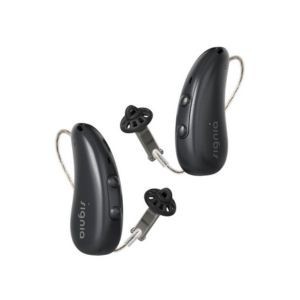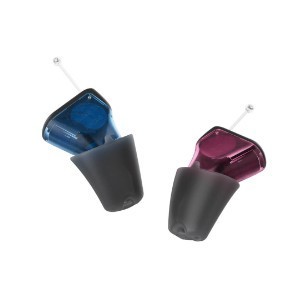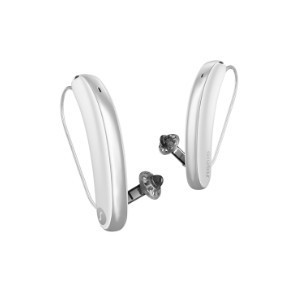Hearing Aids for Tinnitus Reviews, Styles and Prices for 2026
Can hearing aids help tinnitus?
| Hearing Aid UK 18/12/2025 Update |
Are there hearing aids for tinnitus?
If you experience both hearing loss and tinnitus, your audiologist might suggest using a hearing aid. In this section, we’ll explore how a hearing aid could benefit you. Hearing aids can be effective on their own or when combined with other therapies and self-care strategies.
Tinnitus meaning
But what exactly is tinnitus? Tinnitus is a persistent sound in the ear that is not the result of any external sound source. Normally experienced as a ringing in the ears, it can usually only be heard by the individual who is experiencing the symptoms.
Currently, about 10% of the UK population suffers from persistent tinnitus, and around 1 in 10 of these find that it has a large impact on their quality of life. The British Tinnitus Awareness (BTA) organisation also states that around 80% of the UK population who suffer from tinnitus also have hearing loss.
With this in mind, and since hearing loss is often a gradual process, many are astonished when hearing loss is diagnosed alongside their tinnitus complaints.
Tinnitus causes
What are the common causes of tinnitus? Although we don’t know for sure where tinnitus comes from, some scientists speculate that it is actually ‘noise’ from the brain created in response to its inability to pick up enough sound signals from the hair cells in the ear.
Research continues to be undertaken, but unfortunately, there is currently no cure for this 'invisible condition'; there are successful treatments, support therapies, and choices of hearing aid devices for tinnitus that are designed to relieve symptoms.
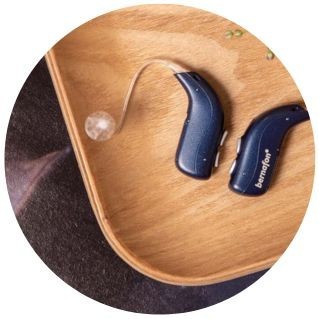
Hearing Aids for Tinnitus UK
The effectiveness of hearing aids for tinnitus therapy
Do hearing aids help tinnitus?
Is there a hearing aid for tinnitus, and do they work? Hearing aids can be an effective treatment for tinnitus, particularly for people who also have hearing loss. Many hearing aids now come with tinnitus-specific features that can help to reduce the perceived intensity of the tinnitus and improve the person's quality of life.
Studies indicate that hearing aids can indeed reduce the impact of tinnitus for a large percentage of individuals. Back in a 2007 US survey of hearing care professionals, they reported that about 60% of their patients with tinnitus had their symptoms eased through hearing aids, and roughly 22% of their patients had experienced significant relief.
If you are wondering about the efficacy of hearing aids for tinnitus, we recommend the use of hearing aids for those with hearing loss, tinnitus, or both. They can be effective when used alone as Bluetooth hearing aids for tinnitus support or as part of a wider package of hearing healthcare therapy, designed by your audiologist.
How do tinnitus hearing aids work?
Hearing aids help with tinnitus by using various features. These are:
Hearing aids for tinnitus reduce the focus of the tinnitus sounds
Hearing aids enable wearers to hear the noises they may miss, which can be disguised by tinnitus. They make hearing actual physical sounds easier, which makes it easier to ignore irritating internal sounds throughout your day.
For example, such tinnitus maskers produce a low-level, broadband noise that is intended to mask the tinnitus and make it less noticeable.
Hearing aids for hearing aids improve personal mood
Hearing aids for tinnitus can improve emotions and mental well-being, such as reducing depression and anxiety. They assist in giving a better quality of life.
Hearing aids for tinnitus give you cognitive support
Hearing aids help facilitate improved stimulation between the brain and the auditory pathways, which may help support a reduction in tinnitus noises.
Hearing aids for tinnitus offer you full control
Many hearing aids have tinnitus management programmes, which are usually external noises brought in to help mask the troubling sounds of tinnitus.
This can be in the form of white noise or simulated environmental sounds and offers a kind of sound therapy to help sufferers ease their symptoms. This is particularly useful when sufferers experience tinnitus spikes.
Hearing aids for tinnitus improve concentration
Tinnitus hearing aids can help with clearer speech, reducing the ‘effort’ of hearing and, therefore, improving concentration and communication.
Hearing aids for tinnitus provide noise generators
These devices produce a soft, background noise that can help to mask the tinnitus and make it less noticeable.
Hearing aids for tinnitus offer sound therapy
Some hearing aids come with pre-programmed sound therapy options that can help to reduce the perceived intensity of tinnitus. These options may include nature sounds, music, or white noise.
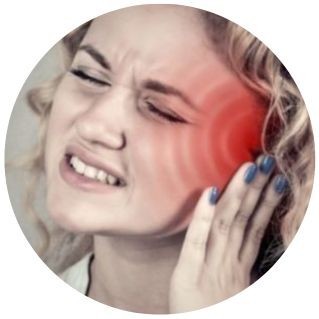
Treatment for Tinnitus NHS
NHS hearing aids for tinnitus
Looking for NHS tinnitus hearing aids?
In the UK, the NHS provides hearing aids to those with hearing loss, including those with tinnitus. The type of hearing aid offered may depend on the individual's specific needs and the severity of their hearing loss.
An audiologist or hearing specialist can assess the patient's hearing and recommend the most suitable option. If a person is eligible for NHS-funded hearing aids, they will be provided free of charge.
The connection between tinnitus and hearing loss
Hearing loss can cause tinnitus, as sound processing changes. In some cases, hearing loss can cause tinnitus, as when you have some degree of hearing loss, naturally, external sounds reach your brain. This results in neuroplastic alterations in the brain, which can change the way it processes sound frequencies.
For instance, for those with hearing loss, the tinnitus sounds they hear might mirror the frequency of the external sounds they struggle to hear or can't hear at all. So, if high-frequency sounds are hard to hear, your tinnitus may also be high-pitched.
This combination makes hearing and communicating even more of a challenge. As hearing loss reduces access to external sounds, this can, in turn, amplify tinnitus sounds like roaring, whistling, ringing, buzzing, and clicking.
There are beneficial hearing aid features now available for tinnitus
As we now know, hearing loss is commonly linked to tinnitus; therefore, there are numerous hearing aids with special features that can manage and support tinnitus symptoms.
Such as masking tinnitus with sounds, and using beneficial apps and relaxation technique programs. These hearing aids come in many types and can also cater to different levels of hearing loss.
Heard of hearing coaches? Other than hearing aid devices, there are also other sources of tinnitus relief, like tinnitus therapy, which are accessible from companies such as The Hearing Coach and various forms of counselling.
You can join tinnitus support groups and forums to connect with those who also have tinnitus and connect to your community through this type of platform.
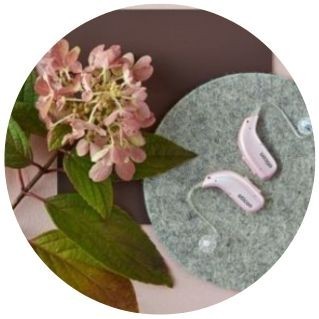
Our Hearing Aids for Tinnitus Review 2026
Hearing Aids for Tinnitus and Hearing Loss
What are our top picks for hearing aids with tinnitus therapies?
Below are our top picks for tinnitus hearing aids 2026 and reviews of hearing aids for tinnitus that can help with symptoms and spikes using various features and tinnitus hearing aid apps.
This list will be edited accordingly as new hearing aid launches are introduced, more advanced tinnitus therapy technology becomes available, or we find a better alternative.
Our tinnitus hearing aid review and recommendations are based on our network of audiologists and their patients' feedback, technology advancement, battery use, and device types.
We always recommend that you speak with your local audiologist about what is available and offer a tinnitus hearing aid comparison, based on your needs, hearing loss, and lifestyle.
So, what are the best hearing aids for tinnitus in 2026? Let's find out what the best hearing aids and tinnitus maskers are recommended by our audiologists
![]()
Winner
Oticon Intent 1 hearing aids hearing aids for tinnitus
With less effort in loud settings, Oticon Intent hearing aids provide more advanced speech comprehension than ever before. How can they help your tinnitus? In difficult listening circumstances, their technology helps you to take an active role in conversations, just like individuals with ordinary hearing would.
Oticon hearing aids also come with Tinnitus SoundSupport to assist in controlling your tinnitus by playing a wide range of soothing sounds. You can modify these sounds until they provide you with the relief you need, wherever you need it. These sounds include waves and white noise.
Oticon Intent hearing aid tinnitus app
Moreover, with the Oticon Intent 1 ON app, alternative tinnitus relief options like your favourite music, audiobooks, podcasts, or even relaxation guides can be streamed wirelessly.
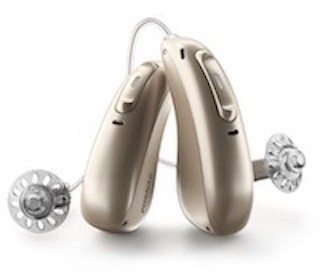
Second Place
Phonak Audeo Infinio Ultra Sphere i90 hearing aids for tinnitus
The Phonak Audeo Infinio Ultra Sphere i90 hearing aids offer advanced features to help manage tinnitus. These devices use innovative sound therapy techniques to mask tinnitus sounds and provide relief.
The i90s' advanced noise reduction and directional microphones help to focus on desired sounds, reducing the perception of tinnitus.
These Phonak hearing aids can be personalised to your specific hearing needs and tinnitus symptoms, ensuring optimal comfort and relief. With the i90, you can experience a significant reduction in tinnitus distress, allowing you to focus on what matters most.
Third Place
Resound Vivia 9 hearing aids for tinnitus
People with tinnitus experience sounds differently. The Resound Relief app easily assists your symptom management needs. How can these devices offer tinnitus relief? Offering a mix of sound therapies, strategies for relaxation and guidance.
Allowing you to design your own soundscapes, like white noise and pieces of music, for up to five layers at a time. There are also relaxation and meditation exercises for when you need them the most and to support you in your tinnitus spikes.
Resound Vivia hearing aid tinnitus app
With the Resound Vivia 9 hearing aids, you can use your smartphone, tablet and Bluetooth speaker headset to get tinnitus relief at your fingertips.
Fourth Place
Widex Allure 440 hearing aids for tinnitus
Widex Allure 440 hearing aids include an AI system that trains your hearing aids and makes them more personalised, so you gain a much better hearing experience and great tinnitus management features. But, how can they help your tinnitus symptoms?
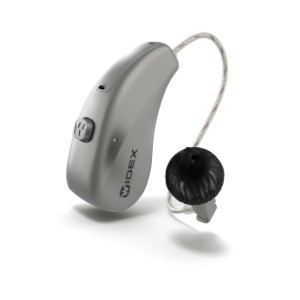
Widex Allure hearing aid tinnitus app
Manage your tinnitus symptoms using Widex Zen Therapy Tones. This is a Widex-owned proprietary function that helps to reduce tinnitus symptoms alongside a wider programme of tinnitus therapies.
These fractal tones are produced by the hearing aid to help you relax and unwind and are used in conjunction with counselling and relaxation techniques to offer relief as part of a management program for tinnitus sufferers.
Fifth Place
Signia 7IX hearing aids for tinnitus
Signia IX provides three distinct strategies to combat tinnitus, tailored to what suits you best: static noise therapy, ocean wave therapy, and Signia’s exclusive tinnitus Notch therapy. Research by Signia found that the use of Notch Therapy revealed a marked improvement in tinnitus symptoms in 65% of users.
Signia IX hearing aids offer a diverse selection of hearing aids, ensuring there’s an option for everyone. However, a drawback is that not all IX models equipped with the tinnitus relief feature have the latest technologies.
For instance, Signia's newer models, such as the Signia Active IX, incorporate more advanced technology compared to the Insio NX, IIC, CIC, and ITE models.
Signia IX hearing aid tinnitus app
Signia offers a tinnitus therapy feature through their Signia app, specifically designed for use with compatible Signia hearing aids. It addresses your tinnitus discreetly and quietly, setting itself apart from the static noise and ocean wave techniques typically found in most tinnitus management programs.
Simply wear your hearing aids as you usually would, and you may notice an improvement in your symptoms within just a few weeks.
Notch Therapy offers a way to diminish your awareness of tinnitus sounds until they become less bothersome. By gradually pushing these sounds into the background over an extended period it reduces over-stimulation, allowing your brain to become more adept at ignoring them, thus minimising irritation.
This app allows users to personalise settings based on their specific tinnitus frequency and severity.
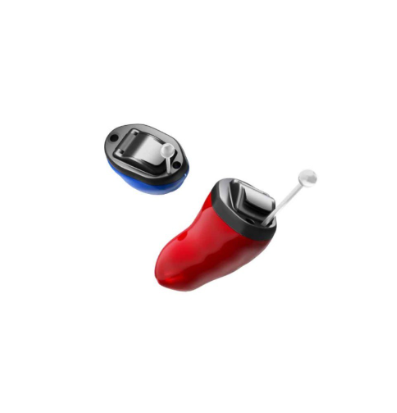
Looking for In-Ear hearing aids for tinnitus?
Signia Insio 7IX is a great example of a discreet hearing aid for tinnitus. A very small and ready-to-wear hearing aid that sits comfortably within the ear canal and streams audio and calls with ease.
They are custom-made devices, so you will benefit from a bespoke fit that is discreet and offers the same great Notch Therapy seen in the above Signia model.
Another benefit is that they are custom-made rechargeable hearing aids, so you can wear them with comfort and confidence, knowing they will give you the support you need all day.

Looking for Tinnitus Hearing Aids Near Me?
Discover how effective hearing aids are for tinnitus locally
Your local audiologist can put you on a tinnitus treatment plan
It's important to note that hearing aids are not a cure for tinnitus, but they can be an effective treatment for many people.
If you are interested in using hearing aids for tinnitus, it's a good idea to speak with an audiologist or hearing healthcare professional to determine the best treatment options for your specific needs. Here is some simple guidance:
Don't ignore the facts about tinnitus:
Hearing loss is a common factor in tinnitus. About 80% of people in the UK who are suffering from tinnitus also have hearing loss. Various research projects provide evidence that hearing aids provide relief. This is why audiologists recommend hearing aids if you suffer from tinnitus and have hearing loss.
Understand the technology that can help tinnitus:
Some modern hearing aids have TSG (tinnitus sound generators) technology within the devices. This can also be called tinnitus therapy. Research online and explore what tinnitus management is available in the industry.
Ask the experts about tinnitus:
Don't suffer in noise - get help and contact your local hearing professional. They have the right training and experience to assess your ears, hearing ability, and tinnitus.
They will go through all the best hearing aids for tinnitus and provide expert recommendations to help you get the help and relief you need, whatever your budget is.
Expand your tinnitus support resources:
As well as wearing hearing aids, you can also tap into sound therapy, counselling and relaxation. Ask your audiologist for more information and guidance for a full support treatment plan.
Conclusion
Hearing aids can be helpful for some people with tinnitus, especially those who also have hearing loss. Tinnitus is the perception of sound when there is no external source of sound. It is a common problem, and many people who have tinnitus also have hearing loss.
Hearing aids can help by amplifying external sounds, which can help to mask tinnitus and make it less noticeable. They can also help to improve communication and overall quality of life for people with tinnitus and hearing loss.
It is important to consult with a hearing healthcare professional to determine whether hearing aids would be helpful in your specific case. They can conduct a thorough evaluation and recommend the best treatment options for you.
Need more support with hearing aids for tinnitus?
Want to know more about digital hearing aids for tinnitus and how they can benefit your hearing?
Fill out the contact form below or call us free on 0800 567 7621 for support and advice on tinnitus symptoms and management.
We will also put you in touch with your local audiologist for your hearing healthcare needs. Such as finding the right tinnitus hearing aids for you and any future tinnitus and hearing aid problems, adjustments, and maintenance.
What's included in our hearing aid prices?
Our specialist service includes:
Do not spend hundreds of pounds without getting a second opinion from us.
Please call us on 0800 567 7621
 Not only are the prices great, but the service is fantastic! Many thanks to your team.
Not only are the prices great, but the service is fantastic! Many thanks to your team.Common questions about hearing aids for tinnitus 2024
Hearing aids for tinnitus help to manage the effects of tinnitus by masking the sounds you hear – usually with white noise. Although very uncommon, if your hearing aids make your tinnitus worse – contact your audiologist immediately so they can make the adjustments needed or find an alternative solution.
Can hearing aids reduce tinnitus?
Hearing aids for tinnitus masking can assist in reducing tinnitus by masking the internal sounds. Using natural sounds or white noise, can switch the focus away from the unpleasant tinnitus sounds.
Will hearing aids stop tinnitus?
Hearing aids for tinnitus are not a cure for tinnitus, but they can help alleviate the symptoms, which in turn, will reduce the negative impact it has on your life.
What are tinnitus sound generators (TSGs)?
These are tinnitus management programs that are designed to teach your brain to be less affected and distracted by your internal tinnitus sounds. This means you can focus on other things within your life. Some programs also offer engaging activity recommendations and tips on how to manage your tinnitus more successfully.
So, how much do hearing aids for tinnitus cost?
What tinnitus hearing aids costs and prices? You are not charged extra for hearing aids that have tinnitus therapies included in the device technology features. Most hearing aids do include features to relieve tinnitus symptoms as standard. However, to give you an idea, our hearing aids start from £595 per hearing aid and £895 for a pair.
Can hearing aids block tinnitus altogether?
Do hearing aids block tinnitus? Hearing aids for tinnitus are there to support and assist your tinnitus symptoms - they can't cure tinnitus. They give you relief when you need it the most, so you can benefit from a better quality of life.
Other pages you might find useful
Ask the Experts
6 Morton Lane
Walkwood
Redditch
Worcestershire
B97 5QA
Latest Launch
When we refer to a product as 'Latest Launch', we mean it is the latest to be released on the market.
New
When we refer to a product as 'New', we mean that the product is the newest hearing aid model on the market.
When we refer to a product as 'Superseded', we mean that there is a newer range available which replaces and improves on this product.
Older Model
When we refer to a product as an 'Older Model', we mean that it is has been superseded by at least two more recent hearing aid ranges.


